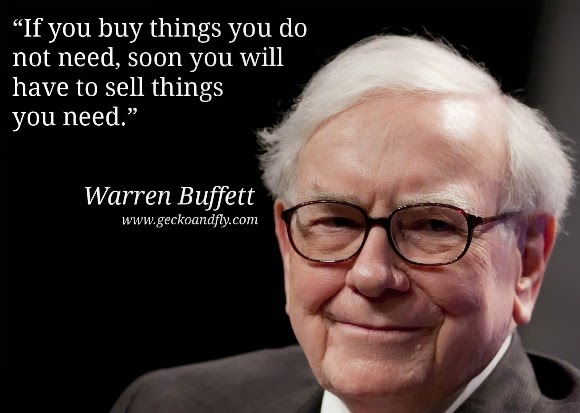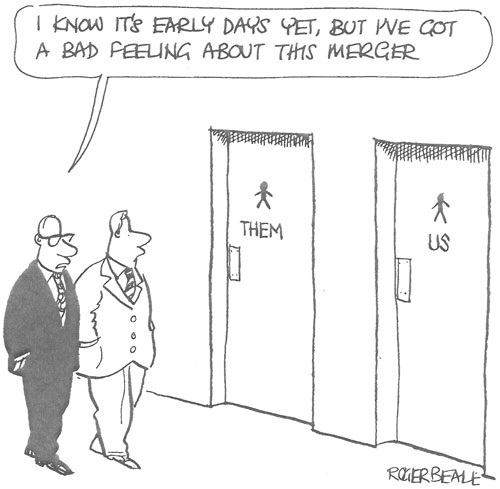M&A: CSR Nightmare or Dream?
 Indeed, the Oracle of Omaha has long expressed his views on mergers and acquisitions, proclaiming most CEOs believe they have "princess power" and can turn frogs into princes. In his 1981 letter to Berkshire Hathaway shareholders, Buffett theorizes that corporate executives must have been entranced by the fairy tale The Frog Prince when they were young.
Indeed, the Oracle of Omaha has long expressed his views on mergers and acquisitions, proclaiming most CEOs believe they have "princess power" and can turn frogs into princes. In his 1981 letter to Berkshire Hathaway shareholders, Buffett theorizes that corporate executives must have been entranced by the fairy tale The Frog Prince when they were young.
"Investors can always buy toads at the going price for toads. If investors instead bankroll princesses who wish to pay double for the right to kiss a toad, those kisses had better pack some real dynamite. We've observed many kisses, but very few miracles. Nevertheless, many managerial princesses remain serenely confident about the future potency of their kisses - even after their corporate backyards are knee-deep in unresponsive toads." - Warren Buffet.
MIT Sloan Management Review echoes the words of Warren Buffett, asserting: "If history provides any guide, many of these (mergers and acquisitions) deals will fail to generate any real value for the shareholders of the acquiring company, and a good number will ultimately become wealth-destroying propositions."In an often elaborate fashion, sizable premiums are paid for target companies, as optimistic acquirers envision and seek synergies.The sole existence of a merger or acquisition is based on the belief that the value of the post-merged firm will be greater than the sum of the values of the individual entities.

Indeed, the potential benefits are multifarious: revenue can be enhanced through augmented market share, cost efficiency can be achieved through economies of scale, and the value of a company can be increased through tax gains and vertical or horizontal integration.
But - if the synergies fall short, the results can be detrimental.In such a scenario, the acquiring company emerges a loser, dragging its shareholders down with it. The vital impediment to successful acquisition is incorrect valuation of the target company. The true value of a company might not be accurately relayed to the buyer, and thus the buyer bears the risk of paying an excessively large premium. Moreover, if stock is awarded in the acquisition and the destruction of value large enough, the premium offered to the acquired firm's shareholders will too be diminished.Sometimes, mergers and acquisitions are the outcome of panicked efforts between two failing companies. Picture two people drowning in water who latch onto each other in final attempts of survival.Kraft Meets Heinz. Three weeks ago, the third largest beverage company in North America (5th largest in the world) was fashioned when Kraft Foods Group and H.J. Heinz Co. reached an agreement (estimated value $49 billion) to merge into a food and beverage conglomerate: The Kraft Heinz Company.While investors rejoiced at their desktops and televisions as they caught wind of the news and envisioned billions of prospective future earnings, sustainability advocates looked on with a wary eye.The chief risk in any acquisition is the potentially detrimental cost cutting that arises as the acquiring company frantically attempts to make back the takeover premium it has paid.Corporate sustainability is too often one of the first facets to be curtailed when companies begin to cut costs. Ethical suppliers, recycling, and the use of renewables are replaced with seemingly lower-cost alternatives - alternatives that typically result in short-term gains at the expense of longer-term profitability.An eagerness to justify the cost of the acquisition often leads to a nearsighted focus on the short-term.CSRHub, a corporate social responsibility and sustainability ratings and information database, aggregates millions of data points covering over 14,000 companies. Kraft came in dead last in environmental and community rankings and achieved a meager industry percentile ranking of 55. Moreover, Kraft's sustainability status has actually declined in recent years. It's worth noting that Kraft's net profits increased from 2012 to 2013, suggesting declining sales was not the likely instigator of poor sustainable performance. Although Heinz ranked higher on all sustainable aspects, there is always a concern that one company will bring down the other.But the real apprehension stems from the fact that both Kraft and Heinz have failed to eliminate palm oil from their supply chains.We briefly discussed the plights of palm oil in 2014 when we examined Cereal Titan Kellogg's Quest for Sustainability. As a refresher, palm oil is an edible vegetable oil derived from an African palm oil tree. 85% of all palm oil is globally produced and exported from Malaysia and Indonesia. And smack dab in the middle of the process of production and exportation is deforestation, animal cruelty, and abuse of indigenous rights.According to the World Wildfire Fund, every hour of palm oil production wipes land in the rainforest equivalent to the size of 300 football fields."This $40 billion merger focuses on growing profits, but these are too often at the expense of chopped down rain forests and human and labor rights violations..a food company of this scale has a massive global footprint, and needs to be accountable for the social and environmental impacts in its supply chains." - Gemma Tillack, Rainforest Action Network Campaign Director.A Silver Lining.The counterargument: M&A activity is hugely positive for sustainability.
Three weeks ago, the third largest beverage company in North America (5th largest in the world) was fashioned when Kraft Foods Group and H.J. Heinz Co. reached an agreement (estimated value $49 billion) to merge into a food and beverage conglomerate: The Kraft Heinz Company.While investors rejoiced at their desktops and televisions as they caught wind of the news and envisioned billions of prospective future earnings, sustainability advocates looked on with a wary eye.The chief risk in any acquisition is the potentially detrimental cost cutting that arises as the acquiring company frantically attempts to make back the takeover premium it has paid.Corporate sustainability is too often one of the first facets to be curtailed when companies begin to cut costs. Ethical suppliers, recycling, and the use of renewables are replaced with seemingly lower-cost alternatives - alternatives that typically result in short-term gains at the expense of longer-term profitability.An eagerness to justify the cost of the acquisition often leads to a nearsighted focus on the short-term.CSRHub, a corporate social responsibility and sustainability ratings and information database, aggregates millions of data points covering over 14,000 companies. Kraft came in dead last in environmental and community rankings and achieved a meager industry percentile ranking of 55. Moreover, Kraft's sustainability status has actually declined in recent years. It's worth noting that Kraft's net profits increased from 2012 to 2013, suggesting declining sales was not the likely instigator of poor sustainable performance. Although Heinz ranked higher on all sustainable aspects, there is always a concern that one company will bring down the other.But the real apprehension stems from the fact that both Kraft and Heinz have failed to eliminate palm oil from their supply chains.We briefly discussed the plights of palm oil in 2014 when we examined Cereal Titan Kellogg's Quest for Sustainability. As a refresher, palm oil is an edible vegetable oil derived from an African palm oil tree. 85% of all palm oil is globally produced and exported from Malaysia and Indonesia. And smack dab in the middle of the process of production and exportation is deforestation, animal cruelty, and abuse of indigenous rights.According to the World Wildfire Fund, every hour of palm oil production wipes land in the rainforest equivalent to the size of 300 football fields."This $40 billion merger focuses on growing profits, but these are too often at the expense of chopped down rain forests and human and labor rights violations..a food company of this scale has a massive global footprint, and needs to be accountable for the social and environmental impacts in its supply chains." - Gemma Tillack, Rainforest Action Network Campaign Director.A Silver Lining.The counterargument: M&A activity is hugely positive for sustainability. In contrast to the teetering marriage of two lumbering behemoths is the scenario where one giant buys a sustainably-focused firm and is able to cost-effectively integrate sustainability into the now-combined entity.It seems reasonable to conclude that Unilver's acquisition of Ben & Jerry's ameliorated the sustainable image of the brand. Today, Unilver is a poster child of sustainability. Analysts have come to consensus that the acquisition was a win-win: Ben & Jerry's adherence to corporate sustainability was integrated into Unilever's business objectives, while Unilever enabled Ben & Jerry's to become profitable.Similarly, L'Oreal actually altered the consumer mindset towards sustainably-produced cosmetics through its acquisition of The Body Shop. While initial investor reaction was unpleasant, wondering why the world's largest cosmetics maker would acquire such a small futile company, an appetite for green cosmetics overcame suspicions in less than one year. L'Oreal now sits at the forefront.The Future of Ketchup.With 1.5 billion in anticipated synergies the headline rationale for the Kraft-Heinz merger, one need not look far to realize that this merger is likely to put the combined company even farther behind its competitors on the sustainable spectrum. Longer-term initiatives will surely be delayed, as an excessive focus on cost reduction and short-term results outweighs managerial pursuit of long-term profitability.And thus we come full circle back to why most mergers fail in the long run.
In contrast to the teetering marriage of two lumbering behemoths is the scenario where one giant buys a sustainably-focused firm and is able to cost-effectively integrate sustainability into the now-combined entity.It seems reasonable to conclude that Unilver's acquisition of Ben & Jerry's ameliorated the sustainable image of the brand. Today, Unilver is a poster child of sustainability. Analysts have come to consensus that the acquisition was a win-win: Ben & Jerry's adherence to corporate sustainability was integrated into Unilever's business objectives, while Unilever enabled Ben & Jerry's to become profitable.Similarly, L'Oreal actually altered the consumer mindset towards sustainably-produced cosmetics through its acquisition of The Body Shop. While initial investor reaction was unpleasant, wondering why the world's largest cosmetics maker would acquire such a small futile company, an appetite for green cosmetics overcame suspicions in less than one year. L'Oreal now sits at the forefront.The Future of Ketchup.With 1.5 billion in anticipated synergies the headline rationale for the Kraft-Heinz merger, one need not look far to realize that this merger is likely to put the combined company even farther behind its competitors on the sustainable spectrum. Longer-term initiatives will surely be delayed, as an excessive focus on cost reduction and short-term results outweighs managerial pursuit of long-term profitability.And thus we come full circle back to why most mergers fail in the long run.
